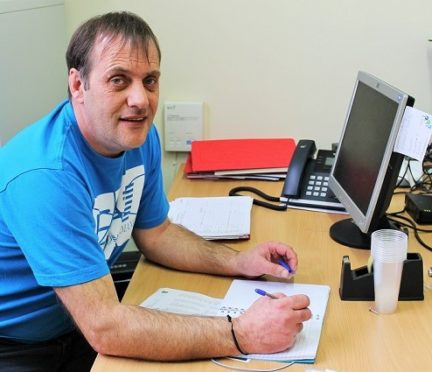
For people living with drug addiction, the stigma around the condition is often just as hard to beat as the plague of the addiction itself.
But, in a move to better the lives of those who have suffered as addicts, Glasgow Alcohol and Drug Recovery Service have recently employed 13 new staff with personal experience of addiction who are hoping to help others on the road to recovery.
Many will work at Glasgow’s network of recovery cafes across the city including Govanhill, the Gorbals, Whiteinch, Parkhead, Ibrox and Easterhouse.
The cafes aim to reduce stigma around addiction, promote recovery by making it visible within communities and upskill people for new and improved lives after addiction.
Dad-of-three, Thomas, 50, from Glasgow’s Gorbals, is one of the new recruits aiming to help others beat addiction.
He started sniffing solvents as a teenager in the 80s and later began to use opiates. Heroin addiction saw him overdosing more times than he can remember and spending years in and out of hospitals and prisons.
He said: “I was aware of the potential consequences, but it was about trying to fit in and find a sense of belonging. It was a form of self-harm to cope with childhood trauma and it had a massive impact on my social, physical and psychological development.
“It also impacted on my family. They tried to be supportive, but they couldn’t understand it, and didn’t know what to do for the best. People understood alcohol addiction in the 1980s, but no-one was prepared for the explosion in drug addiction.”
Attitudinal change in the criminal justice system around the year 2000, set Thomas on the route to recovery after decades of destructive behaviour and stints in prison. Instead of jailing him for shoplifting to feed his habit, a sheriff gave him an 18 months suspended sentence and ordered him to undergo treatment in the community.
Thomas said: “The courts realised they weren’t solving anything by just locking people up. They gave me a chance. I started to engage with services, my care manager was supportive and helpful. I got access to psychotherapy to deal with childhood trauma and the underlying issues of my drug taking. I was sofa-surfing at the time, so I also got involved with homelessness services.”
Six months in rehab at Rainbow House in Glasgow helped him come off drugs and, despite a brief relapse in 2013, he hasn’t looked back. Thomas got involved with the South East Recovery After Care Group – one of the city’s first peer led groups to come out of discussions about service redesign with people with lived experience.
He volunteered full-time with the group and later earned a part-time post as a peer educator. He’s since gained SVQs in health and social care and community development, completed a three week placement in Sweden where he learned about the country’s work to get people recovering from addiction into employment and advised medical professionals and social workers on new treatment options in Glasgow such as the Heroin Assisted Treatment facility and the proposed Safer Drug Consumption Facility.
Thomas has been thrilled to help others in the Gorbals where he admits he was previously known for his addiction and is now known for his recovery.
He is now about to start a permanent, full-time post as a Social Care Worker with South Glasgow Alcohol and Drug Recovery Service.
His message to anyone grappling with addition is: “There is a better life out there. Sometimes it’s just about grabbing it with both hands, accepting help and creating and developing your own opportunities. There is a way out and there are people there to help you.”
Susanne Millar, Glasgow’s Chief Social Worker, believes the views of people with lived experience offer service providers real insight into the barriers to recovery.
She said: “Knowledge from people with lived experience is invaluable to the city’s Health and Social Care Partnership.
“They can understand and empathise with other people who are wrestling with addiction better than anyone else. They know the challenges people face and, importantly, they know coping mechanisms, how to tackle challenges and all about the various services available. We work closely with people with lived experience on many projects. Their input continues to help shape and redesign services, so that they are more easily accessible and deliver better outcomes for people with complex issues.
“People like Thomas are living proof that addiction can be overcome to rebuild successful, productive lives free from drugs and alcohol. I congratulate everyone who recently earned jobs with the recovery service and look forward to working with them all going forward.”

Enjoy the convenience of having The Sunday Post delivered as a digital ePaper straight to your smartphone, tablet or computer.
Subscribe for only £5.49 a month and enjoy all the benefits of the printed paper as a digital replica.
Subscribe